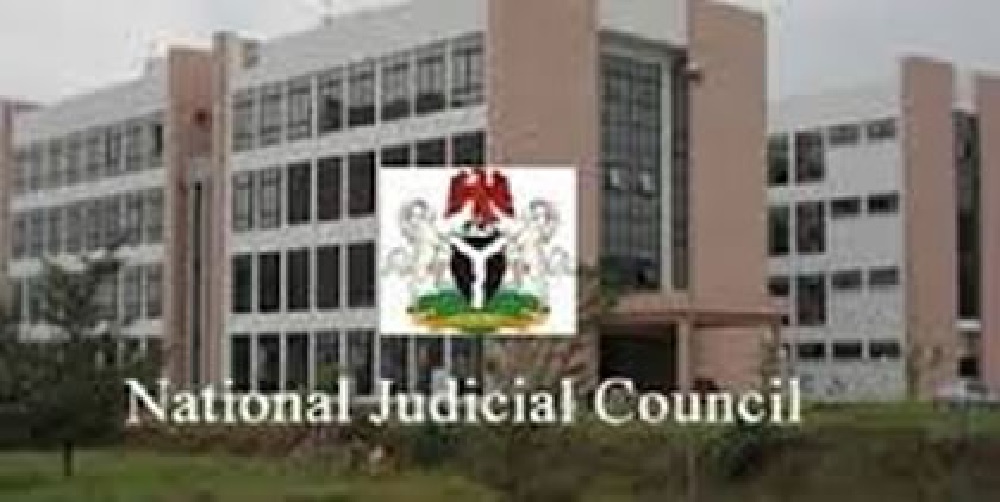News
Drama At Nigerian Code Of Conduct Tribunal As Two Chairman Lay Claim To Office

Mr Danladi Umar has continued to act as chairman of the Code of Conduct Tribunal (CCT) despite a subsisting order from the Nigerian Senate ordering his removal.
In November, the Senate removed Danladi Umar, over alleged gross misconduct. This decision was made under Section 157(1) of the Constitution of the Federal Republic of Nigeria (1999, as amended), which empowers the Senate to remove key public officials following due process.
The sacking followed a closed-door session lasting over one and a half hours.
Upon resumption of plenary, the Senate announced that more than 84 lawmakers supported the decision.
However, CCT officials who spoke to Daily Trust claimed the embattled chairman, Danladi Umar and the newly appointed chairman, Mainasara Kogo, are laying claim to its chairmanship.
It was learnt that the due had officially visited and held discussions with tribunal staff without any clear directive on who is in charge.
President Bola Tinubu had on July 13 appointed Kogo as the new chairman of CCT the same day he announced Omolola Oloworaran as the Director-General of the National Pension Commission (PenCom).
Although the staff complained about the lull in the work of the tribunal since the controversy over Umar’s removal began, it was observed that corruption cases involving public servants are still being taken with several charges listed on the course list either for trial or arraignment.
However, senior staff of the tribunal, who spoke on the condition of anonymity, told Daily Trust that they are confused about who to work with as both men have spoken with them and they are only civil servants who obey instructions.
“We are civil servants and we believe we can work with anyone that comes,” a staff said.
“We have not seen any letter to the effect of these changes. We believe there is a procedure for the removal and appointment of a new chairman of the CCT.
“We know that the president and the two arms of government have made pronouncements but we don’t know if invisible hands are working on these but we know there is a process,” he added.
One of the officials said the process is for the appointee to go through the screening by the Federal Judicial Service Commission (FJSC), who recommends to the National Judicial Council (NJC) and then to the President, who approves and forwards to the Senate for confirmation.
The senior official said there has been a pile of unattended files arising from a lack of clarity on the chairmanship of the tribunal.
“He came today and left and the entire judiciary is now on holiday so we have taken the liberty to adjourn all the outstanding cases to January,” the witness said.
However, a former staff of the tribunal, who pleaded anonymity, criticised Umar for visiting the office after his removal.
“Why is he still coming to work seeking to sign some documents and approve payments to contractors?”
He said Umar’s visits were illegal as he was no longer the chairman of the commission.
After the presidential announcement removing Umar, both the Senate and the House of Representatives in separate plenaries on November 20 and 26, also endorsed his removal as CCT chairman on allegations of misconduct and corruption.
Both resolutions were hinged on Section 17 (3) Part 1, Fifth Schedule of the Nigerian Constitution and Section 22 (3) of the Code of Conduct Bureau and Tribunal Act 2004 for the decision.
The section provides that “A person holding the office of chairman or member of the code of conduct tribunal shall not be removed from his office or appointment by the president except upon an address supported by 2/3rd majority of each house of the national assembly praying that he be so removed for inability to discharge the functions of the office in question (whether arising from infirmity of mind or body) or for misconduct or for contravention of this code.”
The legal dispute over Umar’s tenure is being tested in a suit before a Federal High Court in Abuja by the Community Rescue Initiative, Toro Concerned Citizens and Relief Foundation, who are contending that by the provisions of sections 1(1) and (3), 6(6), 153 (1) (e) & (i) of the 1999 Constitution of the Federal Republic of Nigeria (as amended) as well as Paragraph (3)(a) (vii) and (b) of the Third—Schedule thereof, the purported concurrence of both Senate and the House of Representatives was null, void, unconstitutional and of no effect whatsoever.
News
Court Orders Fast-Tracked Trial Of 15 Workers Held In Prison For 6 Yrs Over Patience Jonathan’s Missing Jewellery

The Bayelsa State High Court has ordered a fast-tracked trial for 15 domestic workers who have spent nearly six years in detention at the Okaka Correctional Centre, Yenagoa, without conviction, over missing jewellery belonging to former First Lady Patience Jonathan.
SaharaReporters gathered that the order came after the prosecution and defence teams reached a rare consensus during Thursday’s proceedings to fast-track the case, which has suffered deliberate and serial delays allegedly masterminded by Patience Jonathan’s private legal team.
“The court proceeded well today, and both parties have agreed to finish the case as soon as possible, with an accelerated hearing. So victory is coming,” a source close to the defence told SaharaReporters.
The 15 accused persons, most of whom were part of Mrs Jonathan’s domestic staff, were arrested in 2019 and have remained in detention without bail, with the case dragging on endlessly for years amid reports of consistent manipulation of court processes.
A previous report by SaharaReporters exposed a pattern of intentional court delays reportedly orchestrated by Mrs Jonathan’s private prosecutors, Ige Asemudara and Samuel Chinedu Maduba, both of whom have been consistently representing the former First Lady since 2019.
“The prosecutors are Ige Asemudara and Samuel Chinedu Maduba,” one of the sources confirmed.
“One of them comes from Lagos while the second travels in from Port Harcourt. They’ve been handling this case from day one, presenting witnesses who come to tell lies. One witness took almost two years,” a source earlier told SaharaReporters.
Sources alleged that Mrs Jonathan gave direct instructions to delay the proceedings.
“The aim is to frustrate the process and keep these innocent people in prison as long as possible. It’s an abuse of the legal system,” a source close to the courtroom told SaharaReporters.
The delay tactics reportedly included health excuses, unreachable witnesses, and repeated adjournments based on flimsy reasons. “Sometimes, Ige Asemudara would claim he is sick or his witness has work. Other times, he just asks for long adjournments,” said another insider.
Shockingly, the judiciary itself was not spared from complicity allegations. A source revealed that the presiding judge initially delayed hearing the bail applications, claiming she wanted to listen to some of the prosecution’s evidence first to determine the nature of the charges.
“When the case started in 2019, they all applied for bail,” the source said. “But the judge told their lawyers to wait so she could hear some evidence. After that, she shockingly denied bail, saying the offences were capital and therefore not bailable.”
Meanwhile, the Bayelsa State High Court has denied any involvement in the delays, recently restating its commitment to speedy justice and dismissing reports of suspects’ trials being delayed.
The court, in a reaction to reports that alleged that the trial of 15 domestic workers facing trial for burglary and theft of jewellery, was being delayed, said the claim was false.
It claimed that, according to available records, the matter had suffered delays due to multiple defence lawyers who must cross-examine witnesses, which had slowed down proceedings. It added that the case had also suffered several adjournments at the instance of counsel.
The delays have left the defence team and families of the detainees stunned, particularly since the prosecution reportedly failed to produce any convincing evidence to support the capital charges.
The affected persons are Williams Alami, Vincent Olabiyi, Ebuka Cosmos, John Dashe, Tamunokuro Abaku, Sahabi Lima, Emmanuel Aginwa, Erema Deborah, Precious Kingsley, Tamunosiki Achese, Salomi Wareboka, Sunday Reginald, Boma Oba, Vivian Golden and Emeka Benson.
They have remained behind bars without justice, caught in the web of power, influence, and a compromised legal process.
With the court finally conceding to an accelerated hearing, hope has once again sparked for the victims of this legal nightmare.
News
Catholic Church gives Anambra APC guber candidate rigid conditions for support

Barely 10 days after he emerged as the All Progressives Congress (APC) gubernatorial standard bearer for the November 8 gubernatorial poll in Anambra State, Prince Nicholas Chukwujekwu Ukachukwu has been given rigid conditions to receive the support of the Catholic Church in the state.
Sources told The Guardian that the basic conditions set before the APC governorship candidate include the selection of a deputy from the Catholic fold, and also that 60 per cent of his cabinet must be Catholics.
This is just as the APC governorship hopeful has been inundated by lobbyists for the position of running mate, even as he engaged with concerned APC stakeholders in the state in a bid to find common ground with various women groups agitating for gender parity.
The Guardian learned that the race for Ukachukwu’s running mate had been narrowed down between two former female Senators, Dr. Uche Lilian Ekwunife and Dr. Margery Okadigbo, who hail from the Central and North Senatorial Districts of the state, respectively.
Although both female politicians are Catholics, the factor of zoning is said to be impacting their chances, because while the more politically active Ekwunife hails from the populous Anambra Central District, Mrs. Okadigbo is from Anambra North, which has just served out eight years of governorship through Willie Obiano.
Also, the fact of her maiden community, Igboukwu in Aguata Local Council, and influence as the current Director General of South East Governors’ Forum is ticking in Ekwunife’s favour, as her candidacy is expected to help slice the votes in Old Aguata Union from where the incumbent Governor Chukwuma Soludo hails. (The Guardian)
News
NJC investigates 18 Imo judges over suspected age falsification

The National Judicial Council has launched a probe into 18 judges in the Imo State judiciary over allegations of age falsification, in a development raising fresh concerns about integrity and transparency within Nigeria’s judicial system.
The NJC, in a statement on Thursday by its Deputy Director of Information, Kemi Ogedengbe, confirmed that the allegations were being treated with utmost seriousness and were currently under review.
“Allegations of this nature require detailed investigation before any action can be taken,” Ogedengbe stated.
“The NJC is investigating the allegations and may take a decision by the end of the month. For now, we cannot act without completing our inquiries. The council will convene and make decisions on the matter.”
The investigation follows a petition submitted by a civil society group, Civil Society Engagement Platform, which described the matter as an “unprecedented breach of judicial integrity.”
The group alleged that the judges deliberately manipulated their birth records to either prolong their tenure or gain appointments within the judiciary.
In a letter addressed to the NJC Chairman and Chief Justice of Nigeria, Justice Kudirat Kekere-Ekun, the platform cited discrepancies in the judges’ official documents, including Law School registration forms, Department of State Services reports, and Nominal Rolls.
The petition, signed by CSEP’s Director of Investigation, Comrade Ndubuisi Onyemaechi, included what it described as compelling documentary evidence marked as Exhibits 001 to 018.
Among those named in the petition is Justice I. O. Agugua, who reportedly has two different birth dates—May 10, 1959, and May 10, 1960—and is also facing separate allegations of misconduct.
Justice C. A. Ononeze-Madu is alleged to have birth records stating both July 7, 1963, and July 7, 1965, while Justice M. E. Nwagbaoso is accused of presenting conflicting dates of birth—August 20, 1952, and August 20, 1962.
The remaining 15 judges also reportedly have varying inconsistencies in their personal data, a revelation that has intensified public scrutiny of the judiciary’s accountability mechanisms.
The NJC, which is constitutionally empowered to discipline judicial officers, is expected to reconvene soon to deliberate on the findings of its inquiry and take appropriate disciplinary actions where necessary.
The unfolding development comes amid mounting calls for institutional reforms to restore public trust in the judiciary and reinforce ethical standards across all arms of government.
-

 News23 hours ago
News23 hours agoBREAKING: Unknown gunmen reportedly storm Senator Natasha’s family residence
-

 News18 hours ago
News18 hours agoAbuja light rail project must be commissioned on May 29-Wike vows
-

 News23 hours ago
News23 hours agoLawmaker Slams NBA Over Rivers Crisis, Demands Return of N300m
-

 News8 hours ago
News8 hours agoTinubu Remains Engaged In Governance From Europe, Will Return After Easter – Presidency
-

 News22 hours ago
News22 hours agoFinally , Lagos Court frees Quadri, young Nigerian who stood before Obi’s convoy in viral photo
-

 News18 hours ago
News18 hours agoJust in: Alleged Herdsmen Armed With AK-47 Rifles Take Over Communities In Benue State
-

 News18 hours ago
News18 hours agoSEYI Tinubu Speaks On Alleged Abduction, Brutalization Of NANS President Atiku Abubakar Isah
-

 Foreign8 hours ago
Foreign8 hours agoTrump To Close US Embassies In South Sudan, France, Others


















